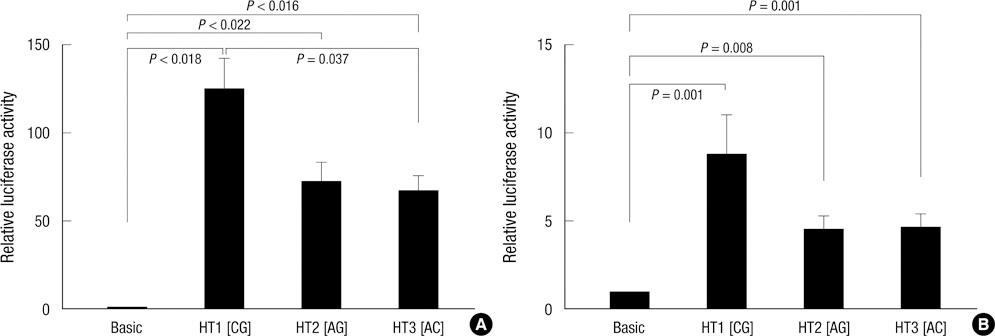J Korean Med Sci.
2012 Apr;27(4):382-387. 10.3346/jkms.2012.27.4.382.
Effect of Interleukin-18 Gene Polymorphisms on Sensitization to Wheat Flour in Bakery Workers
- Affiliations
-
- 1Department of Allergy and Clinical Immunology, Ajou University School of Medicine, Suwon, Korea. hspark@ajou.ac.kr
- 2Department of Internal Medicine, Korea University College of Medicine, Seoul, Korea.
- KMID: 2157898
- DOI: http://doi.org/10.3346/jkms.2012.27.4.382
Abstract
- Lower respiratory symptoms in bakery workers may be induced by wheat flour and endotoxins. We hypothesized that endotoxins from wheat flour may stimulate innate immunity and that interleukin-18 (IL-18) gene polymorphisms may affect their regulatory role in innate immune responses to endotoxins. To investigate the genetic contribution of IL-18 to sensitization to wheat flour, we performed a genetic association study of IL-18 in Korean bakery workers. A total of 373 bakery workers undertook a questionnaire regarding work-related symptoms. Skin prick tests with common and occupational allergens were performed and specific antibodies to wheat flour were measured by ELISA. Three polymorphisms of the IL-18 gene (-607A/C, -137G/C, 8674C/G) were genotyped, and the functional effects of the polymorphisms were analyzed using the luciferase reporter assay. Genotypes of -137G/C (GC or CC) and haplotype ht3 [ACC] showed a significant association with the rate of sensitization to wheat flour. Luciferase activity assay indicated ht3 [AC] as a low transcript haplotype. In conclusion, the regulatory role of IL-18 in lipopolysaccharide-induced responses in bakery workers may be affected by this polymorphism, thus contributing to the development of sensitization to wheat flour and work-related respiratory symptoms.
Keyword
MeSH Terms
-
Adult
Alleles
Allergens/immunology
Antibodies/analysis/immunology
Female
Genes, Reporter
Genotype
Haplotypes
Humans
Interleukin-18/*genetics
Male
Middle Aged
Occupational Diseases/*genetics/immunology
*Polymorphism, Single Nucleotide
Questionnaires
Respiratory Hypersensitivity/*genetics/immunology
Skin Tests
Triticum/*immunology
Figure
Reference
-
1. Cullinan P, Lowson D, Nieuwenhuijsen MJ, Gordon S, Tee RD, Venables KM, McDonald JC, Newman Taylor AJ. Work related symptoms, sensitisation, and estimated exposure in workers not previously exposed to laboratory rats. Occup Environ Med. 1994. 51:589–592.2. Brisman J, Järvholm B, Lillienberg L. Exposure-response relations for self reported asthma and rhinitis in bakers. Occup Environ Med. 2000. 57:335–340.3. Brant A. Baker's asthma. Curr Opin Allergy Clin Immunol. 2007. 7:152–155.4. Hur GY, Koh DH, Kim HA, Park HJ, Ye YM, Kim KS, Park HS. Prevalence of work-related symptoms and serum-specific antibodies to wheat flour in exposed workers in the bakery industry. Respir Med. 2008. 102:548–555.5. Domańska A, Stroszejn-Mrowca G. Endotoxin in the occupational environment of bakers: method of detection. Int J Occup Med Environ Health. 1994. 7:125–134.6. Nakanishi K, Yoshimoto T, Tsutsui H, Okamura H. Interleukin-18 is a unique cytokine that stimulates both Th1 and Th2 responses depending on its cytokine milieu. Cytokine Growth Factor Rev. 2001. 12:53–72.7. Harada M, Obara K, Hirota T, Yoshimoto T, Hitomi Y, Sakashita M, Doi S, Miyatake A, Fujita K, Enomoto T, Taniguchi M, Higashi N, Fukutomi Y, Nakanishi K, Nakamura Y, Tamari M. A functional polymorphism in IL-18 is associated with severity of bronchial asthma. Am J Respir Crit Care Med. 2009. 180:1048–1055.8. Pawlik A, Kaminski M, Kuśnierczyk P, Kurzawski M, Dziedziejko V, Adamska M, Safranow K, Gawronska-Szklarz B. Interleukin-18 promoter polymorphism in patients with atopic asthma. Tissue Antigens. 2007. 70:314–318.9. Joshi VD, Kalvakolanu DV, Hasday JD, Hebel RJ, Cross AS. IL-18 levels and the outcome of innate immune response to lipopolysaccharide: importance of a positive feedback loop with caspase-1 in IL-18 expression. J Immunol. 2002. 169:2536–2544.10. Andrews DM, Chow MT, Ma Y, Cotterell CL, Watt SV, Anthony DA, Akira S, Iwakura Y, Trapani JA, Zitvogel L, Smyth MJ. Homeostatic defects in interleukin 18-deficient mice contribute to protection against the lethal effects of endotoxin. Immunol Cell Biol. 2011. 89:739–746.11. Giedraitis V, He B, Huang WX, Hillert J. Cloning and mutation analysis of the human IL-18 promoter: a possible role of polymorphisms in expression regulation. J Neuroimmunol. 2001. 112:146–152.12. Hedrick PW. Gametic disequilibrium measures: proceed with caution. Genetics. 1987. 117:331–341.13. Schaid DJ, Rowland CM, Tines DE, Jacobson RM, Poland GA. Score tests for association between traits and haplotypes when linkage phase is ambiguous. Am J Hum Genet. 2002. 70:425–434.14. Krakowiak A, Walusiak J, Krawczyk P, Wiszniewska M, Dudek W, Wittczak T, Pałczyński C. IL-18 levels in nasal lavage after inhalatory challenge test with flour in bakers diagnosed with occupational asthma. Int J Occup Med Environ Health. 2008. 21:165–172.15. Khripko OP, Sennikova NS, Lopatnikova JA, Khripko JI, Filipenko ML, Khrapov EA, Gelfgat EL, Yakushenko EV, Kozlov VA, Sennikov SV. Association of single nucleotide polymorphisms in the IL-18 gene with production of IL-18 protein by mononuclear cells from healthy donors. Mediators Inflamm. 2008. 2008:309721.
- Full Text Links
- Actions
-
Cited
- CITED
-
- Close
- Share
- Similar articles
-
- IL-4 Receptor alpha Polymorphisms May Be a Susceptible Factor for Work-Related Respiratory Symptoms in Bakery Workers
- Prevalence of Baker's Asthma among Workers in an Industrial Bakery
- Association of MBL With Work-Related Respiratory Symptoms in Bakery Workers
- The prevalence of baker s asthma due to wheat sensitization in baking factory workers
- Association of beta2-Adrenergic Receptor Polymorphism with Work-Related Symptoms in Workers Exposed to Wheat Flour


